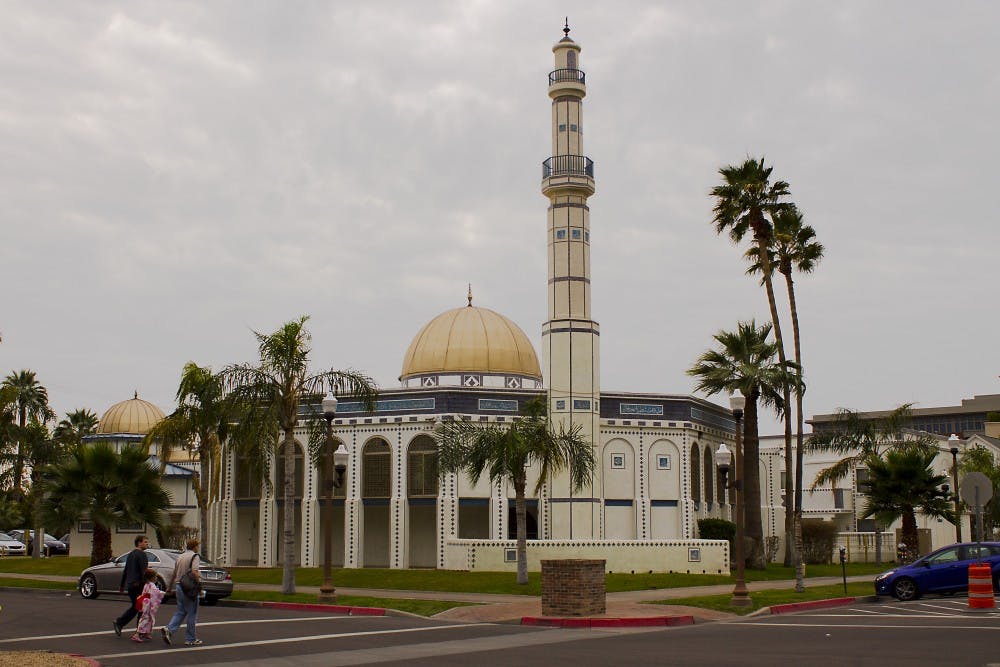 The Tempe mosque near ASU as seen on Sunday, Feb. 22. Muslim students at ASU have raised concerns over their safety in the wake of the Chapel Hill shooting on Feb. 10. (Shiva Balasubramanian/The State Press)
The Tempe mosque near ASU as seen on Sunday, Feb. 22. Muslim students at ASU have raised concerns over their safety in the wake of the Chapel Hill shooting on Feb. 10. (Shiva Balasubramanian/The State Press)Muslim students at ASU are speaking out about concerns for their safety within the community after three Muslim students were killed in Chapel Hill, North Carolina, on Feb. 10.
Deah Barakat, Yusor Abu-Salha and Razan Abu-Salha were shot and killed near the University of North Carolina, and many people are now branding these killings as a hate crime.
ASU alumnus Oday Shahin is among the people calling the killings a hate crime. He said he had a negative experience while attending a vigil for the victims of the Chapel Hill shootings at a mosque in Tempe.
“After the North Carolina shootings, I went to the mosque in Tempe, and there was a vigil there," he said. "My car got egg shelled after parking right across the street.”
While incidents like this have been few at ASU, Shahin said they still happen and seem to have escalated since the North Carolina shootings.
He said he hopes ASU will be more involved in policing rather than reacting to these situations after they happen.
“There have been more incidents reported to law enforcement across the board and particularly harassment against Muslim women, because they are more visibly Muslim,” he said. “Maybe increasing the funding or making sure the escort service works properly could be an answer to these incidents. Safety can be a perception. It doesn’t necessarily have to be the U.S. Army coming down to protect students because it’s not that bad, but something needs to be done.”
Islamophobia is nothing new and has only been escalating recently due to media reports on events around the world including ISIS and the Taliban, Shahin said.
“Islamophobia is something you live with every day, especially Muslim women, but it hasn't reached it’s peak like anti-Semitism or remarks against African-Americans or other minorities,” he said.
Shahin said he is angry about the media's interpretation of Muslims and the lack of coverage on crimes against them.
“I'm kind of tired of Muslims defending themselves and condemning terrorism, because every time we condemn terrorism, the media doesn't listen,” he said. “We are just not getting air time on public TV, and now most Americans, who are never around Muslims, don’t question what is being showed.”
Having leaders speak out against crimes against Muslims is a start to making a change and stopping these events, he said.
“We hear leaders and (President Michael) Crow himself saying Islamophobia isn’t accepted or acceptable, but what is ironic is when you hear people say that they get pressured from fringe groups saying they are catering to Muslim groups,” Shahin said. “Just like there is condemnation against African-Americans, Latinos and even Christians, we still need to hear that from leaders on campus from Crow on down.”
Molecular biology junior Samar El-Sharkawy said after the Chapel Hill shootings things have been kind of scary.
“You get used to people looking at you differently and some people are less friendly, but you never think it’s going to end up dangerous,” she said. “After the shootings, it puts that in the back of your mind and you have to be more careful."
El-Sharkaway recently began wearing the hijab and has noticed a difference in reactions from people on the street.
“I put the hijab on about two and a half years ago, so I have experience on both sides, and I can tell you people treat you differently,” she said. “You kind of get used to the looks and things like that, but now after these shootings, you start to wonder if this person is just giving you a dirty look or are going to try to do something.”
Civil engineering junior Muawiya Shahin said he along with another friend have started a Facebook group to connect Muslim students on campus.
“The group is there so if someone needs to walk to their car at night they can post and whoever wants to accompany him or her they can do so and there isn’t one person walking alone at night,” he said. “It’s kind of like an escort or buddy system.”
As a member of the Muslim Student Association, Shahin said they are planning an awareness week to educate the public on Islam and its principles.
“We really want to spread what Islam is really about and instill knowledge about what it is really about,” he said. “Knowledge is what really helps when these incidents happen.
ASU Police did not respond to multiple requests for interview by the time of publication.
Reach the reporter at jshanco2@asu.edu or on follow @joey_hancock on Twitter.
Like The State Press on Facebook and follow @statepress on Twitter.




